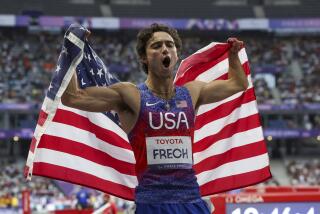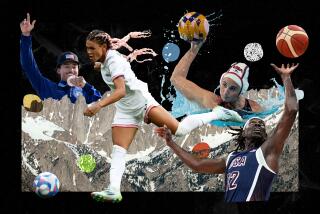Medalists to See More Gold in Marketing Deals
- Share via
Sarah Hughes’ come-from-behind victory Thursday night instantly propelled the teen figure skating sensation to the top of a powerful sports marketing pantheon that can turn an Olympic gold medal winner into a multimillionaire.
But there will be enough riches left over to be shared by an unusually diverse band of athletes whose performances in lesser-known sports have helped define the Salt Lake City Games.
For the record:
12:00 a.m. Feb. 28, 2002 FOR THE RECORD
Los Angeles Times Thursday February 28, 2002 Home Edition Main News Part A Page 2 A2 Desk 2 inches; 50 words Type of Material: Correction
Shea family medalists--A story in Saturday’s Business section incorrectly reported that three members of the Shea family won Olympic medals. Jim Shea won a gold medal in Salt Lake City. His grandfather, Jack, won two gold medals in 1932 in Lake Placid, N.Y. Jim Shea’s father, James, competed in the 1964 Olympics in Innsbruck, Austria, but did not win a medal.
A wealth of business opportunities--including skating tours, product endorsements and Hollywood projects--will be offered to 16-year-old Hughes, sports marketers said. Hughes so far has entrusted her limited business dealings to her father, businessman and lawyer John Hughes.
“If she were to go for the money, so to speak, she could earn between $3 million and $5 million a year,” said Gary Swain, senior vice president at IMG, which operates the Stars on Ice skating revue and represents such athletes as Tiger Woods. “It depends upon what she wants to do, how hard she wants to work.”
Ice skating stars always emerge as the big winners in the Winter Olympics sports marketing derby. IMG, for example, began courting the Hughes family before the Olympics.
But Hughes is not alone. Corporate executives now are looking at bobsledder Vonetta Flowers and speedskaters Apolo Anton Ohno, Jennifer Rodriguez and Derek Parra, who have added a multicolored Olympic hue to a U.S. Winter Olympics squad that’s traditionally been as white as the snow-covered Wasatch Mountains.
“The story line for these Games isn’t just about the ice princesses,” said Keith J. Kreiter, the Chicago-based agent for gold medal skeleton rider Jim Shea.
Snowboarding’s outlaw image in the mainstream media has improved considerably after halfpipe athlete Kelly Clark grabbed the country’s first gold medal and teammates Ross Powers, Danny Kass and Jarret “J.J.” Thomas swept their event.
“There could be niche opportunities for all of these winners in the nontraditional sports,” said Stephen Greyser, a Harvard University professor who studies sports marketing. “Look at Jennifer Rodriguez. A few weeks ago, she was a curiosity, but now she’s a person who could get lots of endorsements and gigs.”
It won’t be an easy sell for most athletes. The advertising industry is in its worst slowdown since the Great Depression. And the sports marketing pie for Winter Olympians typically is smaller than that of their summer counterparts.
“Only a handful of these athletes will see deals with seven-figure digits,” said Kreiter, who also represents silver medal skeleton rider Lea Ann Parsley, the 1999 Firefighter of the Year in Ohio. “But several will do very well from appearances and partnerships with select corporations.”
Some athletes also are understandably skeptical about their newfound corporate friends. “Yeah, snowboarders have been on ‘Leno’ and ‘Letterman’, but it’s ironic that it took a sweep by three Americans to make these guys realize how hip snowboarding is,” said John Stouffer, an editor with the Transworld Snowboarding Business trade magazine.
The Salt Lake City Games that began under the shadow cast by the Sept. 11 attacks probably will be remembered as one of the most compelling sports gatherings in history.
Shortly after Clark grabbed the U.S.’ first gold medal, some observers talked up the halfpipe artist as the sweetheart of the Olympic Games, said Denver-based sports marketing executive Dean Bonham. “But I haven’t heard her name mentioned again.”
Clark quickly was caught up in the landslide of gold, silver and bronze medals won by American athletes. No matter, sports marketers say, that the stories had to percolate up through a figure-skating scandal and threats by the Russian and South Korean delegations to pack up and go home early.
Chris Klug won a bronze medal in snowboard parallel giant slalom just 18 months after a liver transplant. Flowers, a former track athlete, became the first African American to win a gold medal in the Winter Games. Ohno turned NBC’s viewers on to the arcane world of short-course speedskating.
Kreiter already has fielded telephone calls from agents interested in telling the life stories of Parsley, who was honored after helping rescue two people from a burning house, and Shea, the son and grandson of gold medal winners.
When bobsledders and skeleton riders asked Miami businessman Scott Becher to represent them last year, Becher initially thought it would be easier to push a four-man bobsled up a hill than to shake down corporate sponsors for the arcane sports.
Now, with three gold medals, an African American female bobsledder and a third-generation Olympic hero in his sled, Becher is enjoying the ride.
“These are great kids who’ve achieved their athletic dreams and now, because of the recognition they’re finally reaping, are going to get some nice financial rewards,” Becher said.
Athletes in the lesser-known sports know they’re not likely to share in the seven-figure rewards that await top U.S. figure skaters and elite European skiers. “It’s much better than it ever was before for them, but these sports have a relatively limited marketing potential,” said longtime figure skating agent Michael Rosenberg.
Becher sees bobsledders Flowers and Jill Bakken, the No. 2 women’s team in the U.S. before their gold medal run, as “the ideal vehicle for marketers looking to target women.”
Opinions are divided on the sports marketing future of Canadian pairs skaters Jamie Sale and David Pelletier. They’ve already graced the covers of Time and Newsweek and headlined the “Tonight,” “Today” and “Larry King Live” shows, but sports marketers say the popularity of pairs skaters typically fades relatively quickly.
What is clear is that Hughes’ sports marketing future is as golden as the medal dangling around her neck.
“If there’s a gold, silver and bronze to be awarded in the sports marketing arena, the winners are Sarah Hughes, Sarah Hughes, Sarah Hughes,” Bonham said. “She’s the Mary Lou Retton of the 21st century.”
More to Read
Go beyond the scoreboard
Get the latest on L.A.'s teams in the daily Sports Report newsletter.
You may occasionally receive promotional content from the Los Angeles Times.







